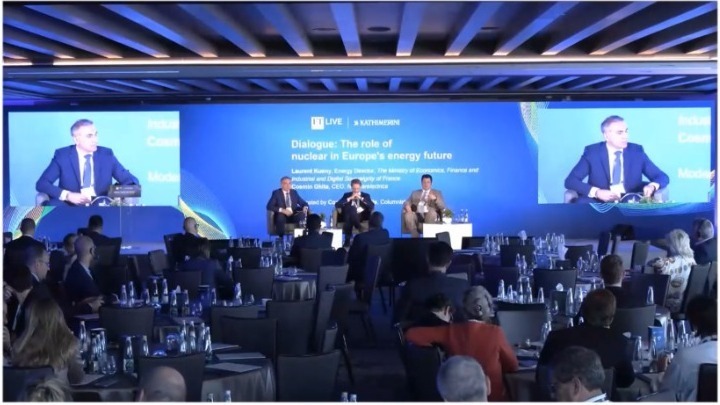Energy Transition Summit: Nuclear energy returns to the forefront in Europe

The role of nuclear energy in the future of Europe was the focus of a detailed discussion at the "Energy Transition Summit: East Med & Southeast Europe" held by the Financial Times and Kathimerini on Tuesday and Wednesday (June 17-18). The summit is being held at the Four Seasons Astir Palace Hotel.
The discussion included Laurent Kueny, Energy Director at the French Ministry of Economics, Finance and Industrial and Digital Sovereignty; Cosmin Ghita, CEO of Romania's Nuclearelectrica; and moderator Constantinos Filis, columnist for Kathimerini, professor at the American College of Greece and member of Greece's National Council on Foreign Policy.
Filis posed questions related to the alignment of European policy, the sustainability of new technologies, and achieving public acceptance. The discussion highlighted the needed return of nuclear energy as a strategic choice for Europe, which must balance the need for energy security with the climate crisis and geopolitical pressures.
France, Romania examples
Kueny noted that France turned from a 70% fossil-fuel energy mix to a nearly fully decarbonized system of electricity production (95%), of which 84% is covered by the country's 57 nuclear reactors. However, he said, 60% of the country's energy mix continues to rely on fossil fuels, and France is prioritizing renewable energy resources for the next decade. High initial capital investment, a long period of construction without revenues, and a high risk factor dissuade private investors. Kueny proposed two basic directions: improving European cooperation on all levels to create standardized financing schemes, and cooperation between European industries to establish a strong local supply chain and reduce reliance on foreign suppliers.
Ghita presented Romania as a dynamic model of innovation and strategic planning. The country is committed to elminating carbon by 2032, which requires the construction of two new and large nuclear reactors, innovating by investing in Small Modular Reactors (SMRs). Their parts are massively produced in nuclear-certified factories and the reactors are assembled on site, like wind turbines. This will reduce construction risk, cost, and construction time, he pointed out.
He also highlighted two critical factors: high public acceptance of nuclear energy (in Romania, it exceeds 80%), and energy security through the European Union: the Euratom Treaty provides a unique safety net, as the European Commission legally owns the entire nuclear fuel in the EU and can redistribute it to member states that lack it, creating a 'fuel bank'.
On camera statements:
https://www.amna.gr/video-services/544358/Corporate%20Videos (YouTube)
https://www.youtube.com/@AMNAwebTV (YouTube)
https://we.tl/YlDOktCGSn (physical archives)

















































































